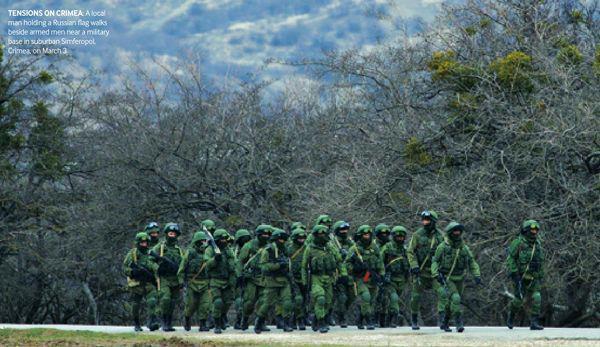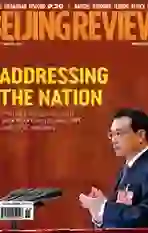The Ukrainian Crisis
2014-03-28BydingYing
By+ding+Ying
The turmoil now ripping apart Ukraine is not unlike a marital crisis. It has had a frustrated partnership with Russia as well as a romance with the seemingly attractive West. Now the country has sunk into an emotional breakup, being torn between two sides. The potential divorce, furthermore, has a difficult problem to solve: the custody of Crimea.
A divorce case can easily turn ugly. Observers suggest keeping an open mind during Ukraines current emotional state and waiting for a political solution. Once it becomes strong and independent, it will have enough power and wisdom to choose a side, or say no to both.
Complicated chaos
Ukraines crisis is a consequence of a series of complicated and interconnected problems.
Domestic protests that lasted more than three months finally escalated into massive bloodshed in late February, leaving hundreds of casualties. Elected President Viktor Yanukovych was ousted and fled to Russia. The country is in jeopardy of separation due to the differing stances among ethnic groups. The Russian Parliament authorized President Vladimir Putin on March 1 to use military force to protect Russias interests in Ukraine, and the West is now preparing sanctions against Russia.
The crisis is like an explosive that was lit by a spark, said Xu Tao, a researcher on Eurasian studies with the China Institutes of Contemporary International Relations, to Beijing Review. “There were problems in terms of political structures, economic recession and games of big powers,” he commented.
“On some level, Ukraine is a tragic pawn in games between superpowers,” said Xu. Ukraine, which was once a republic of the Soviet Union, became independent after the latters disintegration, and has been in a very sensitive geopolitical position between Russia and the West ever since. Maneuvering between the big powers over Ukraine became increasingly fierce after the countrys“Orange Revolution” in 2004. The domestic political situation has been unstable as proRussia politicians grapple with pro-West ones. The eastern part of Ukraine is primarily Russia-friendly for ethnic reasons, while the western area leans to Europe.
The West showed more influence after the “Orange Revolution” when President Viktor Yushchenko came into power in 2005. In 2010, Yanukovych, who is considered pro-Russia, was elected president of Ukraine, as people sensed going West hadnt brought them practical benefits, said Sun Zhuangzhi, a researcher with the Chinese Academy of Social Sciences.endprint
Yanukovych promised to join the European Union (EU) after he was elected. In November 2013, however, he refused to sign the Ukraine-EU Association Agreement. This decision was politically interpreted by the opposition and the West, starting the massive political confrontation inside the country and leading to the current disaster, Sun said.
A country should choose its political regime in accordance with its own situation, said Sun. He explained that the multi-party system expanded gaps between different political forces in the country, while endless political disputes triggered economic depression. Currently, there are over 130 political parties in Ukraine.
Xu pointed out that Ukraines poor economy, corruption and oligarchy have greatly enraged Ukrainians and were important reasons why Yanukovych was ousted.
Poverty and unemployment among ordinary people lie in a stark contrast with the lives of political oligarchs, governmental officials and their families. Meanwhile, according to statistics from Transparency International, a Britain-based non-governmental organization, Ukraine is among the 50 most corrupt countries in the world. In 2012, its Corruption Perceptions Index ranked No. 144 of 174 nations.
Domestic cultural and ethnic differences are additional reasons behind the current chaos, said Xu, who saw the conditions for himself during his travels in Ukraine. “In eastern cities, including Kiev, I could communicate with local people in Russian. They have deep connections with Russia and Russian culture. But in cities in the west, many people couldnt understand Russian, and they felt no connection with Russia, preferring the Western lifestyle instead,” he said.
diplomatic tactics
Observers suggest that Ukraine should accept the current situation until it has enough political and economic strength to make independent decisions.
Putin, in the meantime, has shown a mature diplomatic strategy of using both brain and brawn. “Putin has greater odds of winning this game,” Xu predicted.
Yanukovych asked Putin in a letter to use force to help restore law and order in his turmoilstricken country, Russia announced on March 3. And Moscow still recognizes Yanukovych, who was removed from power by the Ukrainian parliament last month, as Ukraines lawful leader. Russian Prime Minister Dmitry Medvedev declared that Yanukovych was still the “legitimate”head of state despite the latters “negligible” authority. Moreover, Russia said its Black Sea Fleet based in Crimea is not interfering in Ukraines internal political events and that there is no need to send Russian troops to Ukraine “so far.”endprint
The parliament in Ukraines crisisstricken Autonomous Republic of Crimea voted on March 6 to become part of Russia. It also scheduled a referendum for March 16 to determine whether the Crimean people themselves would like to remain part of Ukraine or to join Russia.
Crimea, a multiethnic region with a large Russian population, has enjoyed a high degree of autonomy since Ukraine gained independence. Russia has maintained its only Black Sea naval base in the port of Sevastopol, Crimea.
“Putin adopted a smart diplomatic tactic in dealing with the Ukrainian crisis,” said Xu. Russia will not militarily interfere in the Ukrainian crisis, but it will reserve the right to take military actions depending on the de- velopment of the situation, he added.
The West has expressed a strong reaction to Russias actions. They prepared economic sanctions against Russia, and threatened to refuse to participate in the G8 Summit scheduled to be held in Russias Sochi. Moreover, NATO announced on March 5 to suspend plans for the first NATO-Russia joint escort mission to neutralize Syrias chemical weapons. U.S. Defense Secretary Chuck Hagel said on the same day that the United States plans to expand military cooperation with Poland and Baltic states to show support for its allies amidst the crisis in Ukraine.
Considering Crimeas significance to Russia, it is unlikely that Ukraine will be allowed to completely fall to the West, and Moscow will never give up its influence. There are still hopes for a political settlement, said Xu.
Xu explained that interactions among big powers revealed strong chances for a peaceful result. In a phone call with Putin, Chinese President Xi Jinping said China believes that Russia can coordinate with other parties to push for a political settlement of the issue so as to safeguard regional and world peace and stability, and China supports mediation efforts by the international community that are conducive to reducing tensions.
U.S. President Barack Obama suggested an open relationship between Ukraine, Russia and the West. He said on March 5 that there is room for Ukraine to be a friend of both the West and Russia. Obama urged Russia not to interfere, while admitting that Russia has legitimate interests there. “There is the ability for Ukraine to be a friend of the West and a friend of Russias as long as none of us are inside of Ukraine and trying to meddle and intervene, certainly not militarily with decisions that properly belong to the Ukrainian people,” said the U.S. president.
“The crisis doesnt imply an inevitable divorce between Ukraine and Russia. But Ukraine must accept that it has historical, political, economic and military ties with Russia. It will take Ukraine a long time to create a model for coexisting with both Russia and the West,” said Xu.
Sun believed Ukraine must ultimately find its own way to become strong and independent. “Its very hard to satisfy both Russia and the West at the same time,” he said. “The Ukrainian people should be masters of their own fate.”endprint
